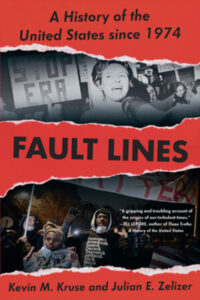 Summary: A recent history from 1974 focusing on the increasing polarization as a result of four “˜Fault Lines’, income inequality, racial division, changing gender roles, and changing sexual norms.
Summary: A recent history from 1974 focusing on the increasing polarization as a result of four “˜Fault Lines’, income inequality, racial division, changing gender roles, and changing sexual norms.
History and the tools of historians are essential to understanding history and how we got to where we are. Kruse and Zelizer are writing a recent history using their tools as historians. I was born in 1973, the year before this really started, and so it was helpful, especially for the first 20-25 years old, where I have some memory but not as much context as I do about the more recent history.
Fault Lines is a brief overview of the past 45 years focusing on the polarization that is a result of increasing diversity and increasing cultural and political power of women, racial minorities and LGBT people and the backlash against those changes. That framing I think is helpful, but incomplete. But I am also not sure how to be more complete without the book ballooning to a thousand pages.
There can be disagreement with where the authors start. The fault lines cited certainly didn’t start in 1974. Racial and gender issues were definitely earlier. Sexual mores have long been changing. Income inequality did start spiking around that time, but did fuel previous political issues. But 1974 was a reasonable starting place.
There is a lot of information that I had either forgotten or did not know. But this is a fairly introductory overview. From what I understand, it is based on an undergrad class that the authors teach at Princeton. In areas where I have a bit more knowledge, the gloss, I think, is a bit superficial in places. For instance, the blame for the 2007 financial crisis was placed on subprime loans, which were a contributing factor, but there was actually more money lost from borrowers who over-extended their credit than from middle-class from low-income subprime borrowers who defaulted. The complexity of the discussion gets better as it goes further, but that initial explanation, I think, was actually wrong, not just incomplete.
I appreciate both the readability and the role that pop culture and tech play in the history. The pop culture and tech are not fluff; they do play an essential role in politics and history of the late 20th and early 21st century, and Fault Lines both cites them for their political and historical influence and, I think, to give human interest to the story.
I also appreciate that Fault Lines is working at giving a complex picture of the book’s subjects. Few characters are presented in a solely positive or negative light. In particular, Carter and Bush Sr are given more credit for their roles, which is where historians generally are moving. And Reagan and Clinton are approached more critically. It does make me want to read more about the Carter and Bush Sr presidencies. (I picked up President Carter: The White House Years last week when it was on sale, and I will read it eventually.)
I listened to Fault Lines on audiobook, and the narration was fine. But the narrator kept trying almost to do voice impressions of well-known politicians. The impressions were close enough to be annoying but not enough to be accurate. I would have preferred that the quotes have been read straight.
Fault Lines: A History of the United States Since 1974 by Kevin Kruse and Julian Zelizer Purchase Links: Hardcover, Kindle Edition, Audible.com Audiobook